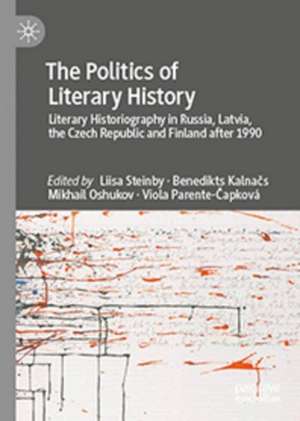The Politics of Literary History: Literary Historiography in Russia, Latvia, the Czech Republic and Finland after 1990
Editat de Liisa Steinby, Benedikts Kalnačs, Mikhail Oshukov, Viola Parente-Čapkováen Limba Engleză Hardback – 8 feb 2024
Preț: 734.90 lei
Preț vechi: 896.22 lei
-18% Nou
Puncte Express: 1102
Preț estimativ în valută:
140.64€ • 145.94$ • 117.55£
140.64€ • 145.94$ • 117.55£
Carte tipărită la comandă
Livrare economică 15-29 martie
Preluare comenzi: 021 569.72.76
Specificații
ISBN-13: 9783031187230
ISBN-10: 3031187237
Ilustrații: XII, 408 p.
Dimensiuni: 148 x 210 mm
Greutate: 0.65 kg
Ediția:1st ed. 2024
Editura: Springer International Publishing
Colecția Palgrave Macmillan
Locul publicării:Cham, Switzerland
ISBN-10: 3031187237
Ilustrații: XII, 408 p.
Dimensiuni: 148 x 210 mm
Greutate: 0.65 kg
Ediția:1st ed. 2024
Editura: Springer International Publishing
Colecția Palgrave Macmillan
Locul publicării:Cham, Switzerland
Cuprins
Chapter 1. Introduction.- Part I Literary Historiography in Russia After 1990:
From a Liberal Search for New Openings Back to the Idea of Russia.- Chapter 2. Historical Introduction.- Chapter 3. Academy of Sciences: Definitive Literary History.- Chapter 4. Post-Soviet University Literary Histories: Defining Russianness.- Chapter 5. Literary History and the Literary Canon in School Education: An Orthodox Upbringing.- Part II Latvian Literature as an Ideologically and Politically Contested Terrain: Literary Historiography Between Foreign Rule, Nationalism, and Comparative Perspectives.- Chapter 6. Introduction: An Outline of the Political and Cultural Development of Latvia.- Chapter 7. Latvian Literary Histories from 1812 to 1940: Popular Enlightenment, Romantic Nationalism, and Political Independence.- Chapter 8. Soviet Latvia and Exile: Political Changes in the Aftermath of WWII and Their Impact on Latvian Literary Histories.- Chapter 9. Literary Historiesin the Period of Independence: The 1990s and Early Twenty-First Century.- Part III Politics of Literary History in the Czech Lands.- Chapter 10. 10 Introduction: History, Politics, Culture and the Origins of Literary Historiography in the Czech Lands till 1918.- Chapter 11. The First Czechoslovak Republic: Literary Historiography 1918–1939.- Chapter 12. Literary Historiography in the 1950s and Early 1960s.- Chapter 13. Politics and Policies in Literary Historiography During the Periods of “Disobedience” (1963–1969) and “Normalization” (1969–1989).- Chapter 14. Literary History Since 1989: Directions, Attempts at Synthesis, Challenges.- Chapter 15. Textbooks in Literary History.- Part IV Finland: From Nation-building in Two Languages Towards a European Identity.- Chapter 16. Literary Histories from Mid-Nineteenth to Mid-Twentieth Century: The Viewpoint of Nationalism.- Chapter 17. The Literary History of a Welfare State: Kuusi’s Literary History.- Chapter 18. Celebrating Finland: Laitinen’s Literary History.- Chapter 19. Opening Windows Toward Europe: The Varpio Literary History.- Chapter 20. In Defense of Poesy: Hallila’s Survey of Contemporary Finnish Literature.- Chapter 21. Swedish-Language Literature in Finland: From a National to a Minority Literature.- Chapter 22. Literary History in the Schools: From Nationalism to Cultural Varieties./
Notă biografică
Liisa Steinby is Professor Emerita of Comparative Literature at the University of Turku, Finland. Her publications include Myth in the Modern Novel: Imagining the Absolute (2023), co-edited volumes Narrative Concepts in the Study of Eighteenth-Century Literature (2017), and Herder and the Nineteenth Century (2020).
Mikhail Oshukov is Assistant Professor at Petrozavodsk State University, Russia. His publications include the articles "Ezra Pound’s Dramatic Works: Vorticist Noh Theater" (2019), "E.E. Cummings: geometry and grammar of revolution" (2017), and "Familiar Otherness: Peculiarities of dialogue in Ezra Pound’s poetics of inclusion" (2013).
Viola Parente-Čapková is Professor of Finnish Literature at the University of Turku, Finland. Her publications include co-edited volumes Women Writing Intimate Spaces: The Long 19th Century at the Fringes of Europe (2023), and Nordic literature of Decadence (2020).
Textul de pe ultima copertă
This book looks at literary historiography in Russia, Latvia, the Czech Republic and Finland, focusing on how seismic shifts in state politics and ideology after 1990 changed the writing of national literary histories in these countries. While Russia saw a return to a more nationalist way of thinking about literature and a new emphasis on Orthodox religion after the fall of the Soviet Union, the opposite is true for Latvia, the Czech Republic and Finland. In these countries, literary historiography fosters connections between Western scholarship and literatures written in the national language and engages with questions such as transnationalism, minorities, culture and power, and the cultural construction of identities. This book scrutinizes the different ways in which the construction of national, cultural and European identities has occurred in and through the literary historiography of North-Eastern Europe in the last few decades.
Benedikts Kalnačs is Senior Researcher at the Institute of Literature, Folklore and Art, University of Latvia, and Professor of Comparative Literature at the University of Liepāja, Latvia. His publications include A New History of Latvian Literature: The Long Nineteenth Century (ed., with Pauls Daija, 2022).
Liisa Steinby is Professor Emerita of Comparative Literature at the University of Turku, Finland. Her publications include Myth in the Modern Novel: Imagining the Absolute (2023), co-edited volumes Narrative Concepts in the Study of Eighteenth-Century Literature (2017), and Herder and the Nineteenth Century (2020).
Mikhail Oshukov is Assistant Professor at Petrozavodsk State University, Russia. His publications include the articles "Ezra Pound’s Dramatic Works: Vorticist Noh Theater" (2019), "E.E. Cummings: geometry and grammar of revolution" (2017), and "Familiar Otherness: Peculiarities of dialogue in Ezra Pound’s poetics of inclusion" (2013).
Viola Parente-Čapková is Professor of Finnish Literature at the University of Turku, Finland. Her publications include co-edited volumes Women Writing Intimate Spaces: The Long 19th Century at the Fringes of Europe (2023), and Nordic literature of Decadence (2020).
Caracteristici
Shows the dependence of literary historiography from a founding ideology Discusses nationalism, in various forms, and communism as background ideologies Reveals the different developments in literary historiography in Russia, Estonia, the Czech Republic and Finland
